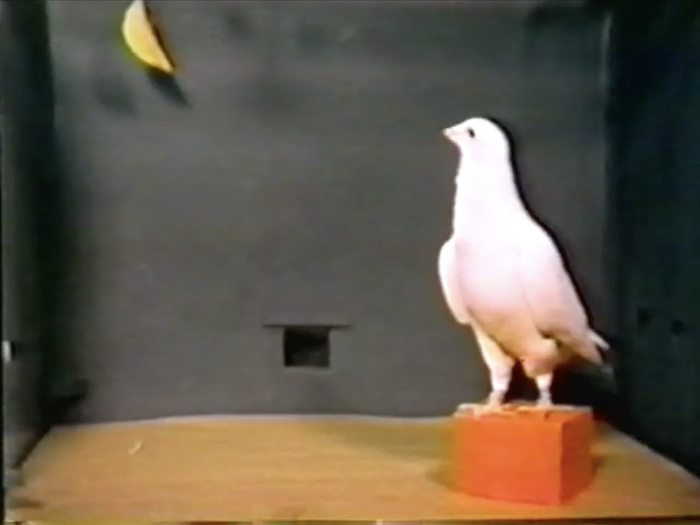
Los Angeles Filmforum presents
Experimentations: Imag(in)ing Knowledge in Film, Program 9
Should We Look at Animals?: The Perils and Pleasures of Nonfiction Animal Films
Sunday December 8, 2024, 3:00 pm
At 2220 Arts + Archives, 2220 Beverly Blvd., Los Angeles CA 90057
Tickets: $10 general, $5 students/seniors, free for Filmforum members
$20 for both programs today
https://link.dice.fm/Hd3a12258412
After the screening, Ben Schultz-Figueroa will be in conversation with Thomas Pringle, Assistant Professor in Cinema & Media Studies at USC
A free dinner will be available between the 3 pm and 7 pm programs.
Comparisons between humans and animals are foundational to the experimental branches of medicine and psychology. Yet converting the bafflingly complex bodies and behaviors of nonhuman animals into scientific models is not a straightforward process. From testing apparatuses to spreadsheets of findings, from textbooks on animal handling to published journal articles, such a transformation requires an intricate system of interlocking media. Film has been an essential, yet largely overlooked, element within this process. Often treated as purely transparent scientific recordings, the films produced out of animal research are in fact deeply formalist works that tested what film could capture through the image of an animal—variously proposing that they could visualize pure thought, the processes of history and culture, and the influence of the environment on an organism. In this capacity, scientific filmmakers often advanced their own theories of media and their relationship to living organisms, theories which overlapped with and influenced figures like Marshall McLuhan.
Curated by Benjamin Schultz-Figueroa
Dr. Benjamin Schultz-Figueroa’s research and teaching focus on the History of Scientific Filmmaking, Nontheatrical Film, Animal Representations on Film, Science Fiction and Horror. He has a forthcoming publication, Viscera, Skin, and Physical Form: Corporeality and Early Cinema. His newest book, being released in February 2023, is The Celluloid Specimen: Moving Image Research into Animal Life (UC Press).
Thomas Patrick Pringle is Assistant Professor of Cinema and Media Studies at the University of Southern California. With Gertrud Koch and Bernard Stiegler, he is the co-author of Machine (2019). Pringle’s writing brings together media history with environmental history and is available to read in several academic and popular venues. He has curated film programs and public events on the history and politics of ecology and climate change in Canada, the United States, and South Africa.
Experimentations: Imag(in)ing Knowledge in Film is Filmforum’s expansive film series and upcoming publication that investigates the ways that experimental and scientific films produce and question the visualization of the world. Combining artist films utilizing scientific imagery, science and natural history films, and films of indigenous and traditional knowledge, the series examines how science, nature, and technology films shape our understanding of humans, nature, gender, knowledge, and progress. The multi-venue public screening series presents analog and digital time-based media incorporating diverse scientific and experimental film traditions from across the globe. The series will include eighteen screenings between September 2024 and February 2025, with films and digital works from 1874 to today from around the world, multiple guests, panels and wonderful collaborations that will reveal the possibilities and circumstances of cinema in this realm.
Experimentations: Imag(in)ing Knowledge in Film is among more than 70 exhibitions and programs presented as part of PST ART. Returning in September 2024 with its latest edition, PST ART: Art & Science Collide, this landmark regional event explores the intersections of art and science, both past and present. PST ART is presented by Getty. For more information about PST ART: Art & Science Collide, please visit: pst.art.
Major support for Experimentations: Imag(in)ing Knowledge in Film is provided by the Getty Foundation and The Andy Warhol Foundation for the Visual Arts. Additional Support from the Los Angeles County Board of Supervisors through the Los Angeles County Department of Arts & Culture, and the Department of Cultural Affairs, City of Los Angeles.
Screening (subject to change):
Problem Solving by Chimpanzees (Wolfgang Köhler, 1914-1917, digital transfer, b&w, silent, 8:00)
An Experimentally Produced “Social Problem” in Rats (O.H. Mowrer, 1939, digital transfer, b&w, silent, 10:52)
Interview with Calhoun (John B. Calhoun, 1970, digital transfer, color, sound, 38:28)
Animal Sexual Behavior Films (Alfred Kinsey & William Dellenback, circa 1940-1950, 16mm transferred to digital color, sound)
Pigeon & Red Block (B. F. Skinner, 1947, 16mm transferred to digital, color, silent, 1:01)
Project Orcon (B. F. Skinner, 1942, 16mm transferred to digital, color, silent, 2:59)
The Behavioral Revolution (B. F. Skinner, 1975, 16mm transferred to digital, color, sound, 28:36)
Watch Elon Musk’s Neuralink Monkey Play Video Games with his Brain (2021, digital, color, sound, 3:27)

